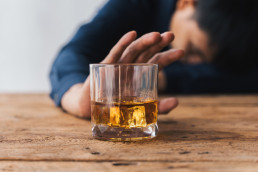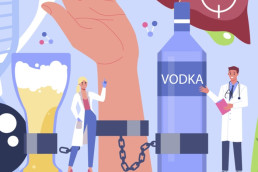What's the Best way to Quit Alcohol
Embracing Sobriety: The Best Strategies for Quitting Alcohol
Introduction
Quitting alcohol can be a life-changing decision, benefiting both physical health and mental well-being. However, the journey to sobriety is often challenging, requiring dedication, support, and the right strategies. This article aims to guide those looking to quit alcohol, offering practical advice and compassionate insights.
Understanding Your Relationship with Alcohol
The first step in quitting alcohol is to understand your relationship with it. This involves recognizing patterns, triggers, and the reasons behind your drinking.
Self-Reflection: Assess when, why, and how much you drink. Understanding these factors can help identify the root causes of your alcohol use.
Acknowledging the Impact: Reflect on how alcohol affects your life, including health, relationships, and work.
Creating a Plan to Quit
A structured plan increases the chances of successfully quitting alcohol.
Set Clear Goals: Define what quitting means for you – whether it’s complete abstinence or reducing consumption.
Develop a Timeline: Create a realistic timeline for reducing and eventually stopping alcohol consumption.
Seeking Support
Quitting alcohol is often more successful with a support system.
Professional Help: Consider consulting a healthcare provider or a therapist specializing in addiction. They can offer medical advice, therapy, and sometimes medication to ease withdrawal symptoms.
Support Groups: Groups like Alcoholics Anonymous (AA) provide a community of individuals who understand the challenges of quitting.
Managing Withdrawal and Cravings
Withdrawal symptoms can be a significant hurdle in quitting alcohol.
Understand Withdrawal Symptoms: Be aware of common withdrawal symptoms like anxiety, shaking, and nausea. Severe symptoms require medical attention.
Coping Strategies: Develop healthy coping mechanisms, such as exercise, meditation, or engaging in hobbies.
Lifestyle Changes
Making positive lifestyle changes can support your journey to sobriety.
Healthy Habits: Focus on nutrition, exercise, and adequate sleep to improve overall health.
New Activities and Hobbies: Replace drinking with new activities that bring joy and fulfillment.
Dealing with Relapses
Relapse can be part of the recovery process. It’s important not to view it as a failure but as a step in the journey.
Learn from Relapses: Understand what led to the relapse and use this knowledge to strengthen your sobriety plan.
Seek Support: Reach out to your support network or professional help if you experience a relapse.
Conclusion
Quitting alcohol is a personal journey that requires commitment, support, and self-compassion. By understanding your relationship with alcohol, creating a structured plan, seeking support, managing withdrawal symptoms, making lifestyle changes, and learning from relapses, you can successfully navigate the path to sobriety. Remember, every step towards quitting alcohol is a step towards a healthier, more fulfilling life.
May 16, 2023
I think I am drinking too much alcohol
I am a chronic alcoholic. Yes, I said it. It’s hard for me to admit this to myself and others but I think it is time…
December 19, 2023
National Alcohol Guidelines?
The UK government recommends that both men and women should not regularly drink more than 14 units per week to reduce…
Selected Articles:
December 19, 2023
What’s the Best way to Quit Alcohol
Quitting alcohol can be a life-changing decision, benefiting both physical health and mental well-being. However, the…
May 16, 2023
Are Hangover Blackouts Normal?
Waking up with a fragmented memory or complete amnesia of events after a night of heavy drinking can be a disconcerting…
May 16, 2023
What Drugs are your Kids Taking?
n today’s fast-paced and increasingly complex world, the issue of drug use among teenagers and young adults is a…
National Alcohol Guidelines?
National Alcohol Guidelines
The UK government recommends that both men and women should not regularly drink more than 14 units per week to reduce health risks associated with drinking alcohol. If you do drink up to 14 units a week, it’s best to spread these evenly across a few days and to have at least two drink-free days a week.
When it comes to single drinking occasions you can keep the short term health risks at a low level by sticking to some simple suggestions:
- Limit the total amount of alcohol you drink on any occasion.
- Drink more slowly, drink with food and alternate alcoholic drinks with water
- For pregnant women, or women planning to get pregnant, the safest option is to avoid alcohol completely. This keeps the level of risk to the baby to a minimum.
For more information on the new alcohol guidelines please click here
Alcohol limits and driving
The legal limit for driving is 80 micrograms of alcohol per 100 ml of blood. The breath test limit is 35 micrograms in 100ml of breath
There is no fail safe guide as to how much you can drink to stay under this limit.
The amount and type of alcoholic drink, and your height, weight and metabolism will all play their part.
Advice to avoid drink driving
- Never offer a drink to a driver
- Stick to non-alcoholic and soft drinks
- Arrange for someone who is not drinking to drive
- Take a taxi
- Use public transport
- Stay overnight
Post
What’s the Best way to Quit Alcohol
Quitting alcohol can be a life-changing decision, benefiting both physical health and mental well-being. However, the journey to sobriety is often challenging, requiring dedication, support, and the right strategies.
December 19, 2023
Post
National Alcohol Guidelines?
The UK government recommends that both men and women should not regularly drink more than 14 units per week to reduce health risks associated with drinking alcohol.
December 19, 2023
Selected Projects:
Organically grow the holistic world view of disruptive innovation via workplace diversity and empowerment of everyone.
Post
What’s the Best way to Quit Alcohol
Quitting alcohol can be a life-changing decision, benefiting both physical health and mental well-being. However, the journey to sobriety is often challenging, requiring dedication, support, and the right strategies.
December 19, 2023
Post
National Alcohol Guidelines?
The UK government recommends that both men and women should not regularly drink more than 14 units per week to reduce health risks associated with drinking alcohol.
December 19, 2023
The Effects of Alcohol
How does alcohol affect different parts of the body?
Brain: Irrational behaviour, aggressive nature, violence, depression, nervousness, chronic anxiety, hallucinations, epilepsy, insomnia, dementia (wet brain), serious psychiatric disorders, alcoholic amnesia, blackouts, damage to nerves.
Face: Skin condition deterioration, puffy eyes, facial discolouration
Throat: Chronic coughing, throat cancer, cancer of the larynx (voicebox), cancer of the oesophagus
Lungs: Increased frequency of colds and ‘flu as resistance to infection is reduced. Increased risk of pneumonia and tuberculosis
Heart and circulation: ‘Fatty’ heart, weakness of heart muscle, heart failure, anemia, impaired blood clotting.
Liver: Liver damage leading to cirrhosis, liver cancer, ‘fatty’ liver
Stomach and digestion: Severe stomach inflammation, gastritis, peptic ulcer, haemorrhage, vitamin deficiency, malnutrition, vomiting, diarrhoea, duodenal ulcers
Hands: Trembling hands, ‘shakes’, tingling fingers, numbness, loss of sensation in fingers, peripheral neuritis
Pancreas: Inflammation of pancreas leads to acute or chronic pancreatitis
Kidneys: Impaired kidney function, urinary infection
Sex in Men: Impaired sexual performance leading to impotence. In Women – unwanted pregnancies, increased risk of giving birth to underweight or disabled babies
Legs: Impaired sensation leading to numbness, unsteady gait, falls, causing damage.
Feet: Numb or tingling toes, peripheral neuritis
Alcoholism is the third leading cause of death. Continued misuse can lead to social, legal, domestic, job and financial problems. Your lifespan may be cut by ten to fifteen years and it may lead to suicide, accidents and deaths from drunken driving. If you choose to drink, then drink in moderation.
May 16, 2023
What Drugs are your Kids Taking?
n today’s fast-paced and increasingly complex world, the issue of drug use among teenagers and young adults is a…
May 16, 2023
I think I am drinking too much alcohol
I am a chronic alcoholic. Yes, I said it. It’s hard for me to admit this to myself and others but I think it is time…
Selected Articles:
May 16, 2023
What Drugs are your Kids Taking?
n today’s fast-paced and increasingly complex world, the issue of drug use among teenagers and young adults is a…
May 16, 2023
Are Hangover Blackouts Normal?
Waking up with a fragmented memory or complete amnesia of events after a night of heavy drinking can be a disconcerting…
December 19, 2023
National Alcohol Guidelines?
The UK government recommends that both men and women should not regularly drink more than 14 units per week to reduce…
What Drugs are your Kids Taking?
Introduction
In today’s fast-paced and increasingly complex world, the issue of drug use among teenagers and young adults is a growing concern for many parents. With the rise of prescription drug misuse, the proliferation of new synthetic substances, and the ongoing challenges of traditional illicit drugs, it’s more important than ever for parents to be informed and vigilant. This article aims to shed light on the types of drugs that young people may encounter and offers guidance on how to approach this sensitive topic.
Understanding the Drug Landscape
The first step in protecting your children is understanding what substances are commonly used and the risks they pose.
Prescription Drugs: Misuse of prescription drugs like painkillers, sedatives, and stimulants is increasingly common among teens.
Illicit Drugs: Traditional substances such as marijuana, cocaine, ecstasy, and heroin continue to be prevalent.
Synthetic and Designer Drugs: Newer drugs, such as synthetic cannabinoids (spice) and synthetic stimulants (bath salts), are particularly dangerous due to their unpredictable effects.
Over-the-counter (OTC) Drugs: Abuse of OTC medications, like cough syrups and cold medicines, is often overlooked but can be harmful.
Recognizing the Signs of Drug Use
Being able to recognise the signs of drug use can help in intervening early.
Physical Signs: Changes in sleep patterns, weight loss or gain, and unexplained health issues can be indicators.
Behavioural Changes: Look for shifts in mood, loss of interest in activities, changes in social circles, and academic or behavioural issues at school.
Communication is Key
Open and honest communication is crucial in preventing and addressing drug use.
Start the Conversation Early: Discuss the dangers of drug use in an age-appropriate way, starting when children are young.
Create a Safe Space: Foster an environment where your children feel safe discussing difficult topics without fear of judgment or harsh punishment.
Prevention Strategies
Prevention is always better than cure when it comes to drug use.
Education: Educate yourself and your children about the risks and consequences of drug use.
Be Involved: Take an active interest in your child’s life, know their friends, and understand their challenges and pressures.
Set Clear Expectations and Consequences: Be clear about your expectations regarding drug use and the consequences of breaking these rules.
Seeking Help
If you suspect your child is using drugs, it’s important to seek help promptly.
Consult Professionals: Reach out to counsellors, therapists, or healthcare providers experienced in dealing with adolescent drug issues.
Support Groups: Consider support groups for both your child and your family.
Conclusion
Understanding the drug landscape, recognising the signs of drug use, maintaining open communication, implementing prevention strategies, and seeking help when needed are all crucial steps in ensuring the safety and well-being of your children. As a parent, your awareness, involvement, and support can make a significant difference in your child’s life choices and their ability to resist the pressures of drug use. Remember, tackling this issue is not just about preventing drug use; it’s about guiding your children towards a healthy, safe, and successful future.
May 16, 2023
I think I am drinking too much alcohol
I am a chronic alcoholic. Yes, I said it. It’s hard for me to admit this to myself and others but I think it is time…
May 16, 2023
What Drugs are your Kids Taking?
n today’s fast-paced and increasingly complex world, the issue of drug use among teenagers and young adults is a…
Selected Articles:
May 16, 2023
Are Hangover Blackouts Normal?
Waking up with a fragmented memory or complete amnesia of events after a night of heavy drinking can be a disconcerting…
December 19, 2023
What’s the Best way to Quit Alcohol
Quitting alcohol can be a life-changing decision, benefiting both physical health and mental well-being. However, the…
December 19, 2023
National Alcohol Guidelines?
The UK government recommends that both men and women should not regularly drink more than 14 units per week to reduce…
Are Hangover Blackouts Normal?
Are Hangover Blackouts Normal? Understanding the Risks and Realities
Introduction
Waking up with a fragmented memory or complete amnesia of events after a night of heavy drinking can be a disconcerting experience. Commonly referred to as a ‘hangover blackout,’ this phenomenon raises important questions about alcohol consumption and its effects on memory. This article delves into what hangover blackouts are, their implications, and how to prevent them, providing crucial insights for anyone concerned about the effects of excessive drinking.
What is a Hangover Blackout?
A hangover blackout, or alcohol-induced amnesia, occurs when high levels of alcohol consumption impair the brain’s ability to form new memories. It’s important to distinguish between two types:
Fragmentary Blackouts: Often called “brownouts,” these involve partial memory loss, where you remember only bits and pieces of the night.
Enbloc Blackouts: These are more severe, characterized by a complete inability to recall a stretch of time, despite efforts to jog your memory.
Understanding the Causes
Blackouts are primarily caused by a rapid increase in blood alcohol concentration (BAC). When BAC rises quickly, it disrupts the hippocampus, the part of the brain responsible for forming new memories.
Rapid Drinking: Consuming large amounts of alcohol in a short period significantly increases the risk of a blackout.
Type of Alcohol: High-proof alcohol can raise BAC more quickly, leading to a higher blackout risk.
Individual Differences: Factors like genetics, body weight, and tolerance levels also play a role in how one’s body processes alcohol.
Are Blackouts a Sign of Alcohol Abuse?
Occasional blackouts don’t necessarily indicate alcohol addiction, but they are a sign of risky drinking behaviour. Frequent blackouts should be taken seriously as they can increase the risk of:
Physical Injury: Impaired memory and coordination can lead to accidents and injuries.
Risky Behaviors: Blackouts can result in engaging in unsafe activities, including unprotected sex or driving under the influence.
Mental Health Issues: Regular heavy drinking and blackouts can contribute to anxiety, depression, and other mental health disorders.
Prevention and Risk Reduction
The most effective way to prevent hangover blackouts is to moderate alcohol intake. Here are some practical tips:
Pace Yourself: Drink slowly and avoid rounds or drinking games.
Eat Before Drinking: Having food in your stomach slows down the absorption of alcohol.
Stay Hydrated: Alternate alcoholic drinks with water to stay hydrated and slow down your drinking pace.
Know Your Limits: Be aware of your personal limits and stick to them.
When to Seek Help
If you or someone you know experiences frequent blackouts, it may be time to evaluate your relationship with alcohol. Seeking help from a healthcare professional or a support group like Alcoholics Anonymous can be a crucial step towards healthier drinking habits or sobriety.
Conclusion
While hangover blackouts can happen to anyone who drinks too much too quickly, they are not a normal or safe aspect of alcohol consumption. Understanding the risks associated with blackouts and practising moderation can help prevent these potentially dangerous occurrences. Remember, being mindful of your drinking habits is not just about avoiding hangovers; it’s about taking care of your overall health and well-being.
May 16, 2023
Are Hangover Blackouts Normal?
Waking up with a fragmented memory or complete amnesia of events after a night of heavy drinking can be a disconcerting…
December 19, 2023
What’s the Best way to Quit Alcohol
Quitting alcohol can be a life-changing decision, benefiting both physical health and mental well-being. However, the…
December 19, 2023
National Alcohol Guidelines?
The UK government recommends that both men and women should not regularly drink more than 14 units per week to reduce…
Selected Articles:
December 19, 2023
National Alcohol Guidelines?
The UK government recommends that both men and women should not regularly drink more than 14 units per week to reduce…
May 16, 2023
What Drugs are your Kids Taking?
n today’s fast-paced and increasingly complex world, the issue of drug use among teenagers and young adults is a…
I think I am drinking too much alcohol
I think I am drinking too much alcohol
I am a chronic alcoholic. Yes, I said it. It’s hard for me to admit this to myself and others but I think it is time for me to stop drinking.
The National Institute on Alcohol Abuse and Alcoholism (NIAAA) has established the following guidelines for men and women:
- Women should have no more than one drink per day or seven drinks per week.
- Men should have no more than two drinks per day or 14 drinks per week.
These guidelines are also known as “low-risk” drinking limits. Drinking more than this can increase your risk of alcoholism and other health problems, such as liver disease or breast cancer.
I figured it out
You may have just realized that you are drinking too much. If this is the case, then you should stop drinking alcohol immediately. The health risks of excessive drinking are well-documented and can be extremely serious, even fatal. When I realized I was drinking too much alcohol, I stopped right away. Now I feel better than ever!
I want to thank my friend who helped me realize that I needed to stop drinking so much. It was a tough decision at first but now that I have stopped drinking I feel great!
Something clicked inside me now
I have always been a heavy drinker, and I have never thought of myself as an alcoholic. I just assumed that drinking was fun and that it made me feel good. But recently, something clicked inside me and I realized that my drinking has become a problem. It’s gotten to the point where my body is tired all the time, even though it’s only 2 pm on a Tuesday! I don’t know if it’s because of all the drinking or if my body is telling me something else is wrong. Either way though, I think about getting healthy when I am driving around town during the weekdays with nothing to do but think about how much alcohol my body consumed last night at all those bars we went to last night…
I just want to be healthy
- I have a dream
- I want to be healthy and live a long life
- I want to be happy with myself and others around me.
My body is tired
You may be drinking too much if you feel tired all the time, even on days that are not particularly busy. When you have a headache after drinking, it is likely to be accompanied by a pounding sensation in your temples and nausea. If your hangover gets worse every time you drink, this could indicate an alcohol problem. Some people develop a fever when they drink too much alcohol and their bodies are fighting off the effects of intoxication; if this is happening to you, it could mean that your body is trying to rid itself of excess toxins caused by excessive alcohol consumption. Passing out from drinking too much alcohol can be dangerous because it puts your health at risk—if this happens while driving or engaging in other potentially dangerous situations, being able to recognize warning signs will help ensure that nobody else gets hurt as well as yourself!
It’s not easy to stop but it’s worth the effort
If you’ve been drinking a lot of alcohol and want to stop, it can seem like an overwhelming challenge. It’s difficult because:
- You can lose control over how much or how often you drink.
Your friends and family may not understand your decision. They may try to make you drink again.
It will take time to feel better without alcohol – at first, things might seem worse before they get better.
However, if you stick with it and work hard on your new habits, things will get easier as time goes by!
Conclusion
I know that many people struggle with drinking too much alcohol. It’s not easy to stop but it’s worth the effort. I hope that my story will help others who are struggling with this problem.
May 16, 2023
What Drugs are your Kids Taking?
n today’s fast-paced and increasingly complex world, the issue of drug use among teenagers and young adults is a…
May 16, 2023
Are Hangover Blackouts Normal?
Waking up with a fragmented memory or complete amnesia of events after a night of heavy drinking can be a disconcerting…
May 16, 2023
I think I am drinking too much alcohol
I am a chronic alcoholic. Yes, I said it. It’s hard for me to admit this to myself and others but I think it is time…
Selected Articles:
December 19, 2023
National Alcohol Guidelines?
The UK government recommends that both men and women should not regularly drink more than 14 units per week to reduce…
May 16, 2023
What Drugs are your Kids Taking?
n today’s fast-paced and increasingly complex world, the issue of drug use among teenagers and young adults is a…
December 19, 2023
What’s the Best way to Quit Alcohol
Quitting alcohol can be a life-changing decision, benefiting both physical health and mental well-being. However, the…









